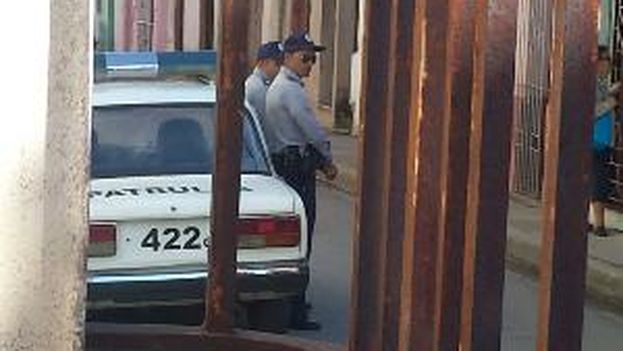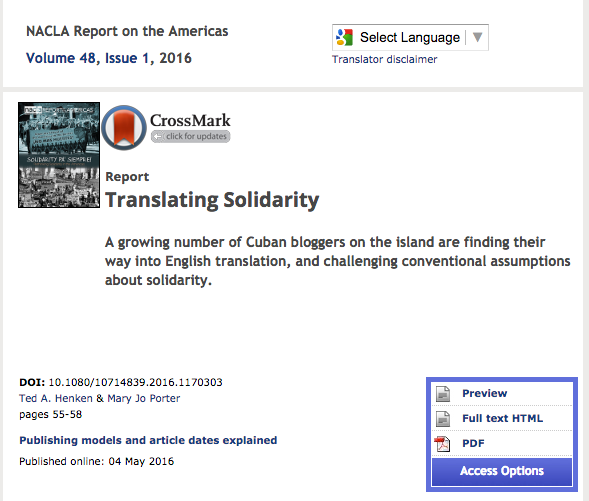 The above article, recently published by the North American Congress on Latin America (NACLA), can be read by clicking on the image, or here. The article describes how and why TranslatingCuba.com came to be.
The above article, recently published by the North American Congress on Latin America (NACLA), can be read by clicking on the image, or here. The article describes how and why TranslatingCuba.com came to be.
Category: Translating Cuba
Cuba Must End “Apartheid Against Its Citizens” / Oscar Arias, Laura Chinchilla
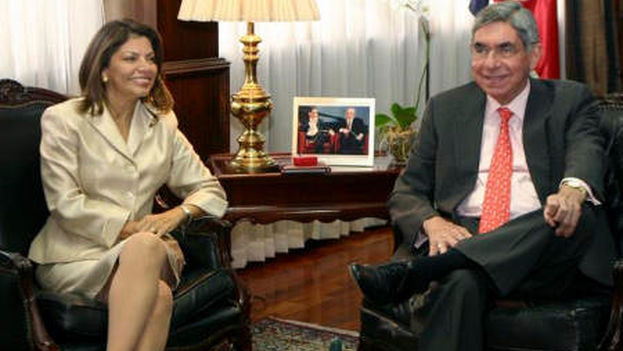
The undersigned, Latin Americans and diverse in our allegiances, professions and interests, but united by a common aspiration for freedom, democracy, equality and well-being throughout the hemisphere, address our fellow citizens and governments, especially those in Cuba, to express the following:
We celebrate the growing process of normalization in Cuban-American relations and the willingness of other democratic states to increase their interaction with the authorities in Havana. We see an opportunity in this process to encourage a greater inclusion of Cuba in the world and to improve the living conditions of its citizens. continue reading
At the same time, we condemn the systematic and continuous violation of human rights on the island; the persistence of a political model centered on the control of a single party; the open repression against those who deviate from the official line, and the continuing discrimination against Cubans in favor of foreigners, in areas ranging from economic rights to free access to communications and information.
The time for an act of reciprocity with the democratic world has come, but above all, as an inescapable duty to its own people, it is time for the regime headed by President Raul Castro to begin a genuine process of political and social openness and to listen to the initiatives for change from its citizens, and to reactivate the timid economic changes announced with enthusiasm, but paralyzed amid rigidity, fear and bureaucracy.
The time has come for Cuba to open itself to its own people.
There is no justification to continue preventing Cubans from asserting the basic rights and freedoms that belong to them, and that are widely recognized by universal instruments of human rights. Many of which, paradoxically, have been signed by their own government.
The road to full democracy must be taken without delay. Each new setback prolongs the precariousness and limitations of the people, hinders the chances of success and raises the risks of internal conflicts. Thus, it is time to begin to open the path, recognizing, at least, the following guarantees for all Cubans:
Freedom of expression, understood as the right to seek, receive and impart information, opinions and other content by any means without limitations, censorship or subsequent repression.
Freedom of association, assembly and demonstration.
Freedom of movement inside and outside the country.
The right to petition the authorities and public powers.
The right to elect and be elected in a multi-party environment for all public offices.
The right not to be arbitrarily arrested and detained, to have fair trials before independent courts and have mechanisms for an effective defense.
The right not to be discriminated against in education, employment or social areas because of political or religious beliefs, or for any other reason.
The elimination of ideological control over education.
The freedom to undertake professional, labor and business initiatives without restrictions, and for Cubans to have at least the same opportunities offered to foreign investors or traders. The virtual economic apartheid, but also social and political apartheid, prevailing on the island against its citizens must end without delay.
None of these very basic rights, which are part of everyday life in the vast majority of our countries, can be exercised in Cuba. Worse still, those who dare to claim them are the targets of open repression and systematic marginalization.
In its 2016 World Report, the NGO Human Rights Watch highlights and documents several cases that “in recent years have significantly increased the short-term arbitrary detentions of human rights defenders, independent journalists and others.” Between January and October 2015, the Cuban Commission for Human Rights and Reconciliation, declared illegal by the government, received more than 6,200 complaints of arbitrary arrests, which were exacerbated prior to the visit of Pope Francis to the island in September of the same year.
The report also reveals the existence of a difficult to determine number of political prisoners, given the absence of reliable information; beatings and assaults against non-governmental protesters in the street; prison overcrowding; case-by-case restrictions on travel within and outside of Cuban territory; the inability to form independent unions; and the refusal to recognize the defense of human rights as a legitimate activity.
The sad conclusion is that, despite the world and particularly the United States, increasingly having become more open to Cuba, the regime has not opened to its own population, which, with some exceptions of privilege, remains mired in insecurity, controls, lack of opportunities and political and social asphyxiation. This closure must be dismantled; the political, economic and social embargo of the Cuban regime against Cubans must be eliminated.
Direct responsibility to end this situation belongs to the elite that has dominated Cuba since its one-party and monolithic state. However, it extends to the governments of Latin America, so far passive actors and even accomplices to chronic arbitrariness and paralysis of the regime.
“Our America” which the hero of Cuban independence José Martí proclaimed as an ideal of Latin American unity, cannot become reality as long as there persists in Cuba a government that is impervious to citizens rights, and that displays a double standard before the world.
In proclaiming these concerns, we express our desire for Cubans to be able to build, in peace and freedom, a new democratic, peaceful and inclusive order.
Oscar Arias (Costa Rica), former president and Nobel Peace Prize in 1987. Laura Chinchilla (Costa Rica), former president. Graciela Fernandez Meijide (Argentina), was Secretary of the National Commission on the Disappearance of Persons. Jaime Malamud Goti (Argentina ), jurist and one of the masterminds of the trial of the military junta in Argentina. Eduardo Ulibarri (Costa Rica), journalist and former Ambassador to the United Nations. Ricardo Gil Lavedra (Argentina), lawyer and politician, member in 1985 of the court that sentenced the military juntas of Argentina’s dictatorship. Beatriz Sarlo (Argentina), essayist and journalist. Carlos H. Acuna(Argentina), political scientist specializing in State and public policy and member of human rights organizations in Argentina from 1977. Roberto Gargarella (Argentina), lawyer and sociologist, CONICET researcher and teacher. José Manuel Quijano (Uruguay), Economist and former director of the Sectorial Commission and the General Secretariat of Mercosur. Sergio Fausto (Brazil), political scientist and Executive Superintedent of the Fernando Henrique Cardoso Institute. Roberto Ampuero (Chile), writer, columnist, former Minister of Culture and former Ambassador of Chile, lived in Cuba between 1974 and 1979. Rodolfo Rodil (Argentina), former vice president of the national Chamber of Deputies. Facundo Guardado (El Salvador), former member of the Farabundo Martí National Liberation Front and former presidential candidate. Daniel Sabsay (Argentina), professor of Constitutional law at the Faculty of law of the University of Buenos Aires. Liliana Riz (Argentina), sociologist and senior researcher of CONICET. Luis Alberto Romero (Argentina), historian, National Academy of History. María Matilde Ollier (Argentina), political scientist, teacher and researcher. Eduardo Viola (Brazil), professor of international relations at the University of Brasilia. Hector Schamis (Argentina), political scientist, teacher, researcher and columnist. Aníbal Pérez Liñán (Argentina), political scientist, teacher and researcher. Vicente Palermo (Argentina), sociologist, writer and researcher with CONICET. Marcos Novaro (Argentina), sociologist, professor and researcher with CONICET. Alejandro Katz (Argentina), essayist and editor. Roberto Garcia Moritán (Argentina), diplomat and former Vice-Chancellor. Fernando Petrella (Argentina), diplomat and former Vice-Chancellor. Jorge Edwards (Chile), writer and diplomat. Osvaldo Guariglia (Argentina), philosopher and researcher with CONICET. María Sáenz Quesada (Argentina), historian, writer and former Minister of Culture of the City of Buenos Aires. Lilia Puig (Argentina), Congresswoman in Parlasur and former national Congresswoman. Juan Octavio Gauna (Argentina), lawyer and politician, former Attorney General and National Deputy. Fernando Pedrosa (Argentina), historian, teacher and researcher. Raquel Gamus (Venezuela), anthropologist, political scientist and journalist. Patricio Navia (Chile), political scientist, teacher and researcher. Adolfo Garce (Uruguay), political scientist, teacher and researcher. Daniel Muchnik (Argentina), journalist, historian and writer. Carlos Gervasoni (Argentina), political scientist, teacher and researcher .Armando Chaguaceda (Cuba), political scientist, teacher and researcher. Daniel Perez (Argentina), designer and painter, published a testimony on the Cuban military intervention in Latin America during the 60s and 70s. Jessica Valentini (Argentina), lawyer and former Ombudswoman in the city of Cordoba. Sabrina Ajmechet (Argentina), sociologist, teacher and researcher. Jorge Elias (Argentina), journalist, writer and researcher. Alejandro Oropeza (Venezuela), political scientist, teacher and researcher. Francisco Quintana (Argentina), lawyer and legislator of the Autonomous City of Buenos Aires. Luis Gregorich (Argentina), journalist and writer. Manuel Mora y Araujo (Argentina), sociologist and communications consultant and public opinion relations. Marta Velarde (Argentina), lawyer and former Congresswoman. Carlos Facal (Argentina), lawyer and former president of the Citizens Power Foundation. Andrés Cañizález (Venezuela), journalist, teacher and researcher. Eduardo Amadeo (Argentina), National Deputy, diplomat, economist and former Minister of Social Development. Gabriel Palumbo (Argentina), sociologist, teacher and researcher. César Ricaurte (Ecuador), journalist and activist for freedom of speech and the press. Nicolas Joseph Isola (Argentina), Doctor of Social Sciences and columnist in various media. Romeo Pérez Anton (Uruguay), political scientist, teacher and researcher. Ignacio Labaqui (Argentina), political scientist, teacher and researcher. Aleardo Laría(Argentina), lawyer and journalist, political exile during Argentina ‘s military dictatorship. Antonio Camou (Argentina), Sociologist, teacher and researcher. Javier Valdez Cardenas (Mexico), journalist. Alejandro Páez Varela (Mexico), journalist. Rolando Rodriguez (Panama), journalist. Maria Sirvent (Mexico), human rights activist. Jose Ruben Zamora (Guatemala), journalist. Rafael Rojas (Cuba), historian, teacher and researcher. Leandro Dear (Argentina), political scientist, professor and head of the NGO electoral transparency. Fernando Ruiz (Argentina), political scientist, teacher and researcher. Martin Landi (Argentina), political scientist and activist freedom of expression. Hugo Machin (Uruguay), journalist and former political prisoner during the military dictatorship in Uruguay. Rogelio Alaniz (Argentina), journalist.
Site interruption was NOT a hack…
Readers — Our apologies, the site has been down. It is a problem on our server, not caused by external forces. Thanks for your patience.
About the Racist Text That Appeared in the Havana Tribune/ Victor Fowler

Victor Fowler Calzada, Havana, 30 March 2016 – Contemporary journalism in Cuba will bear, for a long time, the shame of a commentary titled, “Negro, are you Swedish,” that appeared today in the online edition of the Havana Tribune under the signature of Elias Argudín, in the opinion section.
One is left almost paralyzed on realizing that someone thinks to make a joke by talking this way, and we awake in the land of hallucinations to discover that the “Negro” in question is none other than Barack Obama, the President of the United States who just visited us. continue reading
For my taste and understanding of how a contemporary society should function, it is one of the worst possible displays to a world that is being told there is no racism in Cuba; as a part of the ‘damage control’ after the visit it seems that hours must have been spent calculating the most demeaning way to refer to a political leader his is considered the enemy and who also is
The example of moral turpitude is worthy of anthology and speaking in plural is justified because something like that does get published – much less – without the review of the Editor in Chief as well as the management of the newspaper.
Faced with this formidable gaffe, and at this exact moment, the least those involved should do is apologize to – not to mention ask humbly for forgiveness, from the public that follows them.
The other thing that would be interesting, without hypocrisy or manipulation, is to receive solidarity because — above ideological or political difference – we must not let racial offenses go by without confronting them.
Obama Drops in on a Game of Dominoes in Havana
Before Obama’s visit he appeared on Cuba’s most popular comedy show, “direct from the White House,” and while he was in Havana, he dropped in, in person.
Miriam Celaya had this to say about the earlier episode:
In fact, the talk in Havana is Barack Obama’s daring appearance in the comedy show with the greatest TV audience in the country, Deja que Yo te Cuente, with Epifanio Pánfilo as its main popular character, played by comedian Luis Silva. No doubt it is the most original way he has conceived to reach every household in Cuba, and Cubans are fascinated with that perspective. The natural and easy way Obama has chosen to mingle with Cubans contrasts stridently with the distant and hardbound historical leaders and their claque. It is known that autocrats not only remain isolated in a world that is unattainable for the ordinary Cuban, but that they also don’t know how to smile.
Here is the pre-trip episode:
Declaration from Cuba’s Independent Civil Society in Advance of Obama’s Visit to the Island
Declaration from Cuba’s Independent Civil Society
19 March 2018
The March 20 to 22 visit [to Cuba] of Mr. Barack Obama, president of the United States, in the company of his wife, Mrs. Michelle Obama, closes a cycle of political boldness and has led to and signifies a new era in the Americas.
This historic turning point with Cuba began 17 December 2014 and was greeted and supported by the majority of its citizens, while it generated a logical environment of controversies outside and inside the more than 45 independent activist organizations that were working in the Democratic Action Unity Roundtable (MUAD), among which are those leading the Citizen Platform #Otro18 (Another 2018) and the Civil Society Open Forum, along with other continue reading
Those of us who are promoting this Declaration are not unaware of the dimension of this geostrategic change, and its double impact on our country and on the hemisphere.
The controversial logic of this process expresses the play of opportunities and challenges opening for all Cubans, and for those in the international community who want to help this geostrategic change effectively contribute to democratic change in Cuba.
We believe that the visit of the president of the United States is another step forward in the full normalization of relations with our country. And in this sense, it fosters a better atmosphere to advance our efforts to achieve the democratization of Cuban society and its political system, and the maturation of a project for an inclusive and pluralistic country.
And it is also an opportunity for the Cuban political class to understand that there is there is no longer any room for the philosophy of the “besieged fortress,” which classifies every dissident as a traitor, nor for the maintenance of a politically exclusive, discriminatory and authoritarian regime. The country should be “with all and for the good of all.”
This new atmosphere should support, progressively, debate among Cubans and a radical change in the behavior of the authorities around six basic themes:
- The recognition of the need for a social and democratic state of law, and progress towards the enjoyment of economic, civil and political liberties for all Cubans.
- The immediate ratification by the National Assembly, after the signing by the Cuban government in 2008, of the International Covenant on Civil and Political Rights and the International Covenant on Economic, Social and Cultural Rights, and the creation of a national system that upholds their postulates.
- The cessation of repression and the use of physical violence against all political and human rights activists who use legitimate and non-violent civic action to express their demands.
- The release of all prisoners unjustly incarcerated, especially political prisoners and prisoners of conscience, and those subjected to conditions of parole.
- The repeal of Law 88, the Gag Law, designed to punish Cuban citizens for alleged cooperation with the country that is normalizing, unilaterally and constructively, its relations with the Cuban government and society.
- The establishment of an expeditious and transparent timetable for the return of all the rights of citizenship to Cuban emigrants.
We hope, moreover, that the conversation President Barack Obama will hold with representatives of Cuban civil society will not only strengthen the legitimation of pro-democracy activists on the island, but will encourage other international interlocutors to dialog and publicly recognize the plurality of political and civil actors in Cuba.
As the evolution of world affairs demonstrates, countries’ prosperity, stability and sustainability is increasingly dependent on a comprehensive approach in which economic progress can not and should not be disassociated from progress in freedoms and social justice.
With the coming of Mr. Barack Obama to Cuba one part of the call made by Pope John Paul II in 1988 will be fulfilled: let the world open itself to Cuba. Another good starting point for the Cuban government to definitively open itself to all its citizens.
————-
The first group of signatories to this declaration can be seen here, in the Spanish language version.
Related post: An Agenda For Discussion
Havana’s Beach 16 / 14ymedio
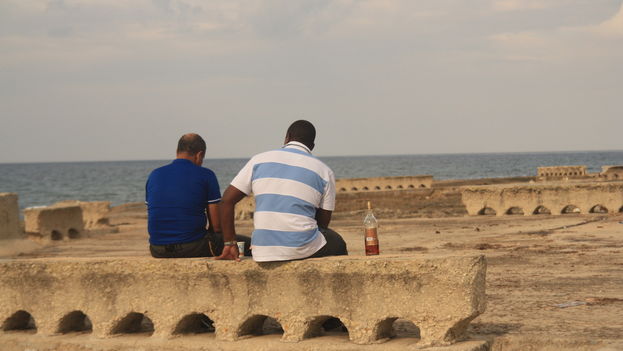
![]() 14ymedio, Havana, 2 February 2016 — There has never been a beach, but a piece of coast full of pieces of concrete. However, this part of the Havana coastline that everyone calls “Playita 16” (Little Beach 16) is a place filled with memories for several generations of Cubans. Free, ugly, and lacking food services and bathrooms, this conjunction of rock and sea has witnessed rockers, frikis, emos, the poverty-stricken and countless couples in love.
14ymedio, Havana, 2 February 2016 — There has never been a beach, but a piece of coast full of pieces of concrete. However, this part of the Havana coastline that everyone calls “Playita 16” (Little Beach 16) is a place filled with memories for several generations of Cubans. Free, ugly, and lacking food services and bathrooms, this conjunction of rock and sea has witnessed rockers, frikis, emos, the poverty-stricken and countless couples in love.
At a time when most of the social centers along the western coastline were for the military or people associated with institutions, this was a place for teenagers looking for a little piece of freedom they didn’t find at home or at school. There were frequent police raids and the vans “loaded with people” heading to the closest police stations. It was also a departure point for dozens of rafters during the Rafter Crisis of August 1994.
Today, despite competition from other meeting sites such as G Street and the emergence of a nice scene beyond the state establishments, Playita 16 has managed to preserve its status as a “place for everyone.” Nothing in it infrastructure has improved and at night, the regulars complain, “you can’t see your hand in front of your face.” But none of that discourages those who frequent it. Of course, to swim there you have to wear shoes, taking care at the edge of the reef, and keep a sharp eye on your towel because of the ever-present thieves.
Cuban Police Demolish The Roof Of An Evangelical Church In Camagüey / 14ymedio
14ymedio, Camaguey, 8 January 2015 – The police, on Friday, demolished the roof of an evangelical church in Camagüey, according to Fernando Vázquez Guerra, coordinator of the Patriotic Union of Cuba (UNPACU) in the province. The center of worship, at number 27 Fourth Street in the Versalles neighborhood, is led by pastor Bernardo de Quesada Salomon, founder of Apostolic Move, a Christian movement that separated from the Cuban Council of Churches in 2003.
Police agents stormed the pastor’s house at dawn, and violently arrested him and took him to the police station on Avellaneda Street, near the railroad station, according to the evangelical pastor Alexis Segundo Medina, who lives in Camaguey.
Several independent journalists and activists have reported police raids and cuts to their phone service to prevent them from approaching the Versalles neighborhood, according to Henry Constantin, a contributor to 14ymedio, who commented before he was arrested for trying to leave his house. continue reading
In a phone call from the 14ymedio newsroom to the Cuban Council of Churches, the president of that body, Joel Ortega, showed surprise at the news, which he labeled as “worrying” and he asked for the phone numbers of the pastors involved to investigate the information.
The conflict between Quesada Solomon’s church and the authorities dates back to 2012. That summer, the pastor’s wife bought the building as housing, reserving an outbuilding for church activities and making some cosmetic changes. In October of the same year, the Department of Physical Planning fined the owner for not having requested a license for the work on the outbuilding, which the authorities considered independent of the house. The pastor affirmed that the Provincial Housing Department itself had assured him that a permit was not necessary. In addition, the outbuilding is included in the deed of the house, and so is considered a part of it.
In December, the religious leader was summoned to a meeting at the Provincial Department of Housing where he was told that he should demolish the floor of the outbuilding. Three years later, in December 2015, the minister complained that Camaguey Physical Planning had issued a demolition order against a ceiling constructed in the outbuilding.
Initially, the order required demolishing the roof and was announced on December 3, to take effect seven working days from that date.
On 4 December, Quesada made an urgent call to the international community through the digital site Religion in Revolution, in which he claimed there was persecution “against the Church where more than 600 people gather.”
Obama Will Travel To Cuba In 2016 If He Can Meet With Dissidents / EFE-14ymedio
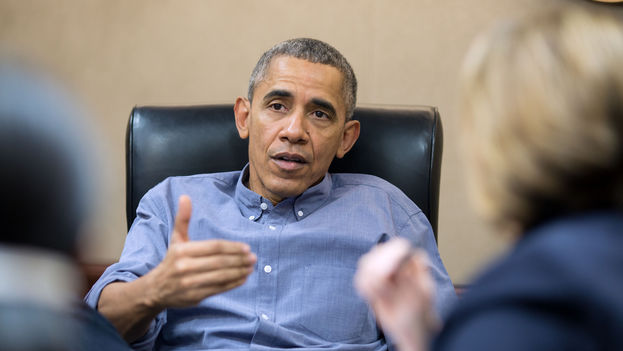
![]() EFE, via 14ymedio, 14 December 2015 — The US President Barack Obama hopes to visit Cuba in 2016, his last year in office, but he only make the trip if he is assured he can meet with dissidents on the island, he said in an interview with Yahoo released Monday.
EFE, via 14ymedio, 14 December 2015 — The US President Barack Obama hopes to visit Cuba in 2016, his last year in office, but he only make the trip if he is assured he can meet with dissidents on the island, he said in an interview with Yahoo released Monday.
“If I go on a visit [to Cuba], then part of the deal is that I get to talk to everybody,” Obama said in the interview, conducted on the eve of the first anniversary of the announcement of the start of the process of normalization of relations between the United US and Cuba.
“I’ve made very clear in my conversations directly with President [Raul] Castro that we would continue to reach out to those who want to broaden the scope for, you know, free expression inside of Cuba,” he said. continue reading
Obama insisted he is “very interested” in visiting Cuba and said it will take a decision “over the next several months.”
“Now would be a good time to shine a light on progress that’s been made, but also maybe to nudge the Cuban government in a new direction.” said the president.
But, If we’re going backward then there is not much reason for me to be there. I’m not interested in just validating the status quo,” he added.
On December 17, 2014, Obama and Raul Castro announced the start of a process to normalize bilateral relations that ended in July, with the reopening of their respective embassies in Havana and Washington after more than half a century of enmity.
Last week, the two countries took a further step towards full normalization with the announcement of an agreement to reestablish direct mail service through a pilot program of transport for mail and packages.
Agreements were also negotiated to establish regular commercial flights between the United States and Cuba and in late November representatives of the two governments in Washington held a meeting focused on the issue of migration and another on combating drug trafficking.
While thousands of Cubans are stranded in Central America in their attempt to reach the United States, Havana has urged Washington to repeat the “Cuban Adjustment Act,” in force since 1966 and which, together with “wet-foot, dry-foot” policy, allows Cubans who set foot in the country to stay.
However, the United States has so far refused to make changes to these measures, even after the restoration of relations with Cuba.
Another issue hindering full normalization is the economic embargo on Cuba, the complete lifting of which can only be done by the United States Congress, but Obama has taken enforcement action to ease travel and some commercial transactions.
Cuban Activists Celebrate The Victory Of The Venezuelan Opposition / 14ymedio
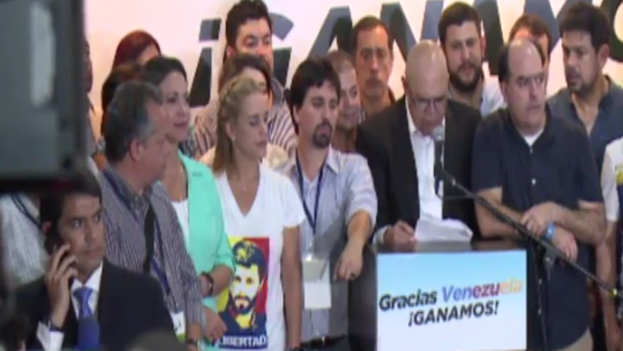
![]() 14ymedio, Havana, 7 December 2015 – Satisfaction in the triumph of the opposition, words of encouragement to the great loser of the contest, Venezuelan president Nicolas Maduro: these, respectively, were the reactions in Cuba among democracy activists and the ruling party. While Cuban activists celebrated the absolute majority of the Democratic Unity Roundtable (MUD), Raul Castro took note of the results and limited himself to predicting “new victories of the Bolivarian and Chavista Revolution.”
14ymedio, Havana, 7 December 2015 – Satisfaction in the triumph of the opposition, words of encouragement to the great loser of the contest, Venezuelan president Nicolas Maduro: these, respectively, were the reactions in Cuba among democracy activists and the ruling party. While Cuban activists celebrated the absolute majority of the Democratic Unity Roundtable (MUD), Raul Castro took note of the results and limited himself to predicting “new victories of the Bolivarian and Chavista Revolution.”
Cubans were able to listen live to the reading of the first election returns on the Telesur channel, after midnight, in the voice of the president of Venezuela’s National Electoral Council (CNE), Tibisay Lucena.
Cuban Catholic activist Dagoberto Valdes believes that these results are “a great triumph of democracy, a sign of the political maturity of the Venezuelan people.” The director of the magazine Convivencia believes “it is clearly the beginning of a new stage in the life of these people and I wish them progress, freedom and democracy.”
Manuel Cuesta Morua, leader of the Progressive Arc, also refers to the vote on Sunday as a “magnificent exercise in democracy continue reading
“The Patriotic Union of Cuba feels the celebration like we were Venezuelans, because we believe that this has been the triumph of the forces that are in favor of democracy, freedom and respect for human rights over a party that has infringed on freedoms and rights for over 15 years,” said the executive secretary of that organization, José Daniel Ferrer. After congratulating the Venezuelan people “for the extremely important electoral democratic fiesta that it has had,” and the Democratic Unity Roundtable for the triumph, he added, “We were happy for Macri’s win in Argentina and we are glad that Venezuelans democrats have triumphed peacefully. This encourages us to continue fighting for the triumph of the democrats on the Island, because someday we will have in Cuba a system that allows the people to freely elect their leaders and their legislators.”
For the economist Martha Beatriz Roque, “There is a reaction in Latin America about what was happening in their towns,” and she emphasizes that “the Venezuelan people were as tired as the Cuban people.” The opposition leader looks to the new year and expects 2016 “to bring new and good things for all of Latin America, especially for Cuba, which right now is suffering another migration crisis that is ruining a ton of homes and undoing the lives of many people.”
The opponent Guillermo Fariñas believes that what happened Sunday in Venezuela is “proof that totalitarian regimes can fool people for some years but not for all the years. The lack of goods, the underdevelopment of the economy, is a sign that characterizes the construction of socialism anywhere in the world.”
The leader of the Ladies in White, Berta Soler, expected the victory of the opposition. However, she believes that “the whole truth is not reflected… God knows how many more votes there were in favor of the Democratic Unity Roundtable and they managed to hide the real number,” argues the activist, who was arrested on Sunday and released around 11 pm. “The truth is that the democrats have won and will keep winning. Maduro’s government has reached a time when it must let go of power. It is the time when the opposition in Venezuela has triumphed and when the Cuban opposition must also triumph.”
SOS: Angel Santiesteban Arrested
A few minutes ago I received a call from a relative of Angel Santiesteban-Prats to inform me that at noon Angel was arrested again. Upon contact with his family, they still did not know why he was arrested and what he is accused of.
He said he would call later in the afternoon and still they have no news of him.
We imagine that it is a reprisal from Castro’s regime for having denounced the life-threatening danger political prisoner Lamberto Hernández Planas is in, on hunger strike, for having been the victim of a new maneuver by the State Security to revoke his parole and prevent his work as an independent journalist.
Once again, as usual for almost three years now, we hold the dictator Raul Castro responsible for the life and integrity of Angel Santiesteban-Prats.
As soon I have news, I will keep updating.
Thanks for passing this on.
Angel’s Editor
Translated by: Rafael
4 November 2015
Writer Angel Santiesteban Arrested Again / 14ymedio
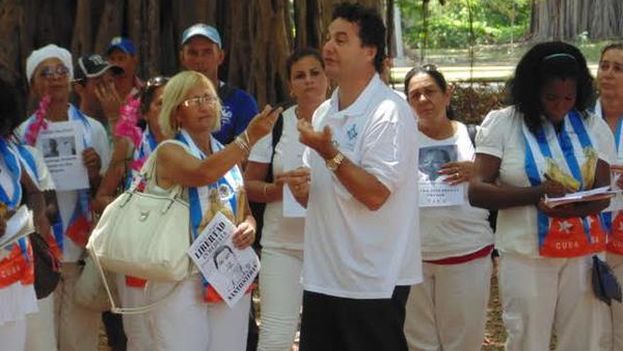
![]() 14ymedio, Havana, 4 November 2015 — The writer Angel Santiesteban was arrested on Wednesday afternoon in Havana. A police car drove the activist from Antonio Gonzalez Rodiles’s house, where he was, to a police station, according to Santiesteban himself who spoke to this newspaper at the time of his arrest.
14ymedio, Havana, 4 November 2015 — The writer Angel Santiesteban was arrested on Wednesday afternoon in Havana. A police car drove the activist from Antonio Gonzalez Rodiles’s house, where he was, to a police station, according to Santiesteban himself who spoke to this newspaper at the time of his arrest.
After the arrest, the blogger Lia Villares informed this newspaper that the police told the writer that it was “circulated for a month,” under the alleged “violation of domicile.” This Thursday he could be “tried in the Fifth Chamber of the court,” the same source stated.
Another source told 14ymedio the writer had missed the last time he was supposed to have signed in at the police station, a control measure that he must complete every week, under the terms of his probation. Should certain information arise, the authorities could use this to revoke his parole and return him to prison.
Last July Santiesteban was released after entering prison in December 2012, after a process that was considered by many to be arbitrary and precipitate. At that time he was convicted and sentenced to five years in prison also for alleged “violation of domicile and injuries.”
The writer has won significant literary awards, including the Casa de las Américas Prize in 2006. His book The Summer God Slept received the Franz Kafka Novel in Drawer Prize in 2013; the prize is given to censored writers whose work is, literally, “in a drawer” because they are unable to publish in their home countries.
Ruins for Tourists / 14ymedio, Reinaldo Escobar
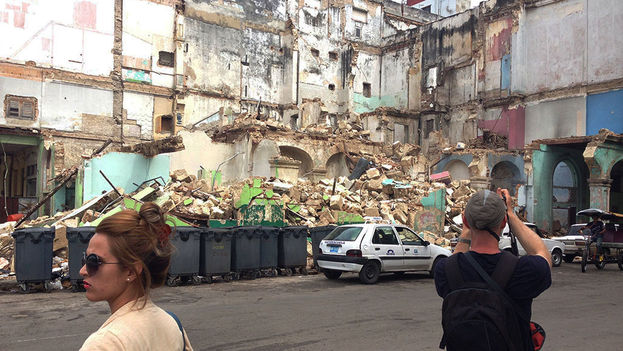
![]() 14ymedio, Reinaldo Escobar, Havana, 23 October 2015 — Tourists like to portray ruins. They do this at the Greek Parthenon, the Roman Coliseum and the crumbling Mexican pyramids. But Havana’s ruins have “another charm.” As in this picture, where a good telephoto lens can capture a tiled wall with enclosed shower, the bowels of an electrical installation, truncated stairs and, hopefully, even the innocent graffiti a teenager scribbled on the wall of his bedroom.
14ymedio, Reinaldo Escobar, Havana, 23 October 2015 — Tourists like to portray ruins. They do this at the Greek Parthenon, the Roman Coliseum and the crumbling Mexican pyramids. But Havana’s ruins have “another charm.” As in this picture, where a good telephoto lens can capture a tiled wall with enclosed shower, the bowels of an electrical installation, truncated stairs and, hopefully, even the innocent graffiti a teenager scribbled on the wall of his bedroom.
This is the corner of Prado and Teniente Rey, where until recently a seedy little bar served as a meeting point for the gay community. A hunting ground, where the roles of prey and hunter were happily played out between prostitutes and middle-aged tourists.
Perhaps this desolate landscape will not last as long as others that have become emblematic of the capital city. With its privileged position, facing the National Capitol, it can be expected that the debris will be cleared away very soon. Perhaps at first there will be a parking lot, and with time a hotel, a store, an office complex.
I fantasize that the ground floor will house a café where deputies will finish settling the arguments still pending in the Parliament. I see lobbyists, stalking like new hunters, the most influential parliamentarians and I also imagine that the odd nostalgic tourist will lament the crime of what they did with the beautiful ruins.
Tania Bruguera is Finalist for the 2016 Hugo Boss Prize / 14ymedio
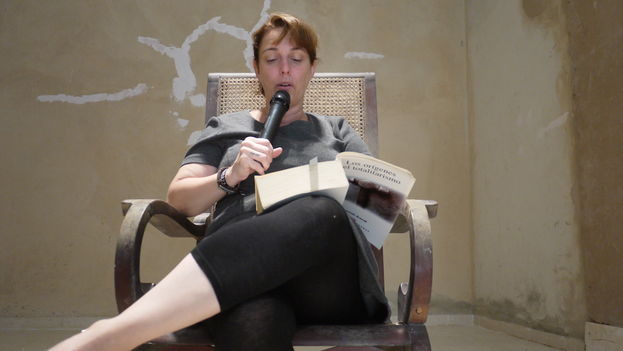
![]() 14ymedio, 23 October 2015 — Tania Bruguera has been selected along with five other candidates as a possible winner of the 2016 Hugo Boss Prize, an award that the Guggenheim Foundation in New York awarded every two years since 1996 in recognition of artists whose work is “among the most innovative and influential of our time.”
14ymedio, 23 October 2015 — Tania Bruguera has been selected along with five other candidates as a possible winner of the 2016 Hugo Boss Prize, an award that the Guggenheim Foundation in New York awarded every two years since 1996 in recognition of artists whose work is “among the most innovative and influential of our time.”
Nancy Spector, Deputy Director and ‘Jennifer and David Stockman Chief Curator’ of the Guggenheim Museum and president of the jury, announced the finalists, chosen by a panel of art critics and curators, on Friday. In the last two decades, the jurors have chosen as finalists influential artists from around the world, recognizing both emerging and established artists of all ages, genders and media.
Along with Bruguera, nominees for the prestigious recognition include the British Mark Leckey, Americans Ralph Lemon and Laura Owens, Egyptian Wael Shawky and South Korean Anicka Yi.
The winner of the Hugo Boss Prize will be announced in the fall of 2016 and will receive $100,000 and hold an exhibition dedicated to their work in 2017 at the Guggenheim Museum.

